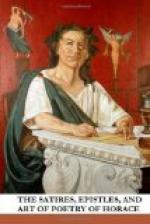Thespis began the drama: rumour says
In travelling carts he carried round his plays,
Where actors, smeared with lees, before the throng
Performed their parts with gesture and with song.
Then AEschylus brought in the mask and pall,
Put buskins on his men to make them tall,
Turned boards into a platform, not too great,
And taught high monologue and grand debate.
The elder Comedy had next its turn,
Nor small the glory it contrived to earn:
But freedom passed into unbridled spite,
And law was soon invoked to set things right:
Law spoke: the chorus lost the power to sting,
And (shame to say) thenceforth refused to sing.
Our poets have tried all things; nor do they
Deserve least praise, who follow their own way,
And tell in comedy or history-piece
Some story of home growth, not drawn from Greece.
Nor would the land we love be now more strong
In warrior’s prowess than in poet’s song,
Did not her bards with one consent decline
The tedious task, to alter and refine.
Dear Pisos! as you prize old Numa’s blood,
Set down that work, and that alone, as good,
Which, blurred and blotted, checked and counter-
checked,
Has stood all tests, and issued forth correct.
Because Democritus thinks fit to say,
That wretched art to genius must give way,
Stands at the gate of Helicon, and guards
Its precinct against all but crazy bards,
Our witlings keep long nails and untrimmed hair,
Much in brown studies, in the bath-room rare.
For things are come to this; the merest dunce,
So but he choose, may start up bard at once,
Whose head, too hot for hellebore to cool,
Was ne’er submitted to a barber’s tool.
What ails me now, to dose myself each spring?
Else had I been a very swan to sing.
Well, never mind: mine be the whetstone’s
lot,
Which makes steel sharp, though cut itself will not.
Although no writer, I may yet impart
To writing folk the precepts of their art,
Whence come its stores, what trains and forms a bard,
And how a work is made, and how ’tis marred.
Of writing well, be sure, the secret lies
In wisdom: therefore study to be wise.
The page of Plato may suggest the thought,
Which found, the words will come as soon as sought.
The man who once has learned to comprehend
His duty to his country and his friend,
The love that parent, brother, guest may claim.
The judge’s, senator’s, or general’s
aim,
That man, when need occurs, will soon invent
For every part its proper sentiment.
Look too to life and manners, as they lie
Before you: these will living words supply.
A play, devoid of beauty, strength, and art,
So but the thoughts and morals suit each part,
Will catch men’s minds and rivet them when caught
More than the clink of verses without thought.




